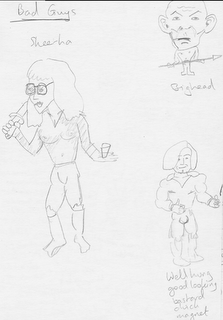I am back in the blogosphere, thanks to Mr Nkhoma generously lending me his laptop - although that was not the reason. Rather, I am supposed to be writing a plan for a study we will shortly be undertaking here at the World Medical Fund, on worm infections, with a view to possibly starting a treatment programme. I will do just that, once I have a bit of diarising off my chest.
Work today was quite tough, starting at 730 and not getting back from clinic until 230, without break. The clinic took some time to reach, being out in the marshland that fills the various depressions near the lake shore (this was once lake but has silted up over the millennia to form wet plains between rocky rises), and only accessible via dirt road. This is fine (if a bit bumpy) for the moment, but I am told access can be cut off during the rains, even for our powerful Landrovers. There was a high proportion of sick children today, mostly malaria, and the usual infections, rashes, poor nutrition. We worked sat on tiny school chairs at school desks, brushing the flies away from our noses, while the mothers patiently waited in the adjoining classroom, in the cacophony of screams and wails from their children. I saw my first case of suspected TB, in a seven year old who had been coughing for over six months, and had become very thin. Another little boy who’d been burned terribly in June came in wearing a headscarf. His mother peeled it off to reveal a black plate of dried stuff (ash?) covering almost the entire top of his head, through cracks in which green pus oozed and a sickly odour emanated. She was convinced the child was a victim of witchcraft, and had been applying traditional medicine, feeling too that hospital medicine had failed her child when he’d been in hospital. This was disheartening in more than one respect: that treatment had been incomplete (the chance of the child receiving the plastic surgery needed for his arms being small), that his mother might well be making things worse by applying poultices (of whose properties I can safely guess only one thing: not sterile), and that the very simplest treatment this child needed i.e. regular cleaning, dry sterile dressing and follow-up, was not available. We took three children back to the Boma hospital, a rather pathetic cluster of low buildings surrounded by pitted bare earth, two broken Toyota pickups, some trees sporting bright orange blossom and the odd goat. Various figures stood on the bare verandahs, or lolled on the floor, either patients or their relatives sheltering from the sun. Tomorrow I will find out more – I am to accompany Mr Chawinga (one of the WMF’s clinical officers) to observe a ward round.
In the afternoon I went to Farmer’s World and bought a bicycle. It is called ‘The Hunter’, the label stating reassuringly that it is ‘all steel’. It is a noble beast, having more moving parts than I could conceive – all rods and bearings – and special bent handlebars that mean you can’t pedal as you go around corners. It came with a pump, spanners, lock and a large mirror on a bendy thing that appears to have no actual means of attaching to the frame. Unfortunately the manufacturing process doesn’t involve tightening any nuts so it was unridable. On the advice of the proprietor I wheeled it around the back to a small bamboo shelter where two men took it from me and took it almost completely to bits and put it back together again in order to tighten it up. I confess I found the scene before me a delight, as with home-made tools, among a sea of broken and rusting bicycle bones, my wheels were dissected, spun and balanced, brakes adjusted, and seat squared. I was off, hefting my wobblesome steed up the road to have a look out over the evening plain. About a mile out of town a young man drew up beside me and told me he’d seen me at the repair shack and witnessed the hasty revision of the price from the initial MK350 to MK850, and that he was very sorry to see a stranger in his country treated that way. He is 17, and wants to be a doctor, and not in Malawi, because Malawians are greedy, although this was probably because they are very poor. We talked a bit about why many children get sick here, and how he might get into medical school. He asked me if I could be his mentor in that regard, and I said ok, though in my mind I doubt that drifting from school to university as I did will provide many gems of wisdom for him, who will have much tougher competition for a place.
Back at the base, my new acquisition received admiring coos and expert whacks on the tyres. Later, talking to Mr Chawinga about what I should do with the bicycle when I leave, he revealed that it cost about three times the security guards’ salary. Saving up for a bicycle on that would take almost as long as would me to save for a car in the UK. I began to feel a little embarrassed by my extravagance, which though useful, is not a necessity.
Please note that any patients mentioned will have had various details changed for confidentiality’s sake.




